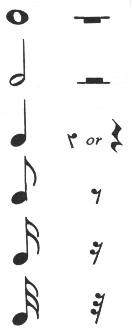
Attention
The Rest Note: An Essential Part of the Music of Life
Your life is moving pretty fast. Is it time to insert a rest note?
Posted November 29, 2014

When taking piano lessons in elementary school, I was introduced to the concept of the rest note—an interval of silence within a piece of music. A rest note creates a deliberate pause, a temporary break in the action. Although they often pass by unnoticed, rest notes are a vital part of musical structure. They keep the other notes from stringing together in a breathless and chaotic way. Our written language includes these rest notes as well: We place periods at the ends of sentences, and we use breaks between paragraphs that convey different ideas.
In life, too, we need these spaces for rest. We have our daily need for sleep, of course. But even our regular weekly rhythm includes a weekend. In addition, some faith traditions strongly endorse the practice of a day of rest. In the Bible, for example, the idea of resting after six days of work was modeled by God (Genesis 2: 2-3) and actually became a commandment for people to follow (Exodus 20:8). In psychological terms, taking some space to rest during the weekend is like placing a period at the end of one week before turning our attention to the next one. Without that space of rest, we can start to feel like our days and weeks are blurring together.
In addition to physical sleepiness, here are some signs that you might need a rest:
Inefficiency and procrastination.

Inefficiency and procrastination.
Poor decisions. You lapse into tunnel vision, desperately trying to get closure on whatever task is at hand. Too fatigued to evaluate the importance of your current goal, you compulsively pursue it so that you can finally check it off your list; but later you look back and see that most of your day is now gone, with other, more important things left undone.
Irritability and resentment.

Irritability and resentment.
Under these conditions, it might seem pretty clear that you'd benefit from a break, a chance to step out of that stream of activity. But what might that much-needed rest look like? For most of us, some additional sleep would be in order. But perhaps more central to the idea of rest is time off from our usual goal-related pursuits, especially those that feel burdensome. Depending on the circumstances, your rest could take the form of a half-hour break during a busy day, a whole day off, or a longer vacation.
Regardless of how long it lasts, a rest note will ideally allow you to meet some of your personal needs. Since you'll be seeking restoration and replenishment for your soul, it’s worth being mindful about where to focus your attention. The simple fact that you’re not working doesn’t necessarily imply that you’re resting. If your “break” involves reading gloomy news stories, watching movies with dark themes, or having lunch with a friend who needs a lot of support, then it’s worth asking yourself: Am I really getting a rest here?

In terms of recharging yourself mentally and emotionally, it's valuable to go beyond simply taking a break from work. For at least part of your time off, try to turn your attention toward something positive: something that you find enjoyable, beautiful, or refreshing. Depending on your personality and interests, you might seek out family or friends, an engaging book or movie, or a delicious meal. You might choose to indulge yourself with your favorite music or a beautiful view. (Even if you can’t easily go somewhere with eye-catching scenery, you might be able to partly meet that need with scenic videos or photos, or by imagining yourself in a lovely place.)
Yet even if convinced of the benefits of rest, many of us have trouble allowing ourselves to take a break. If this is a problem area for you, stay tuned: Next month I’ll focus more specifically on this topic.


